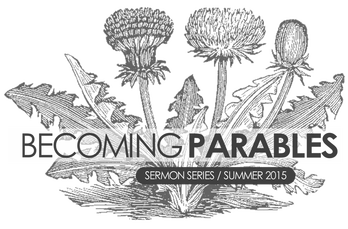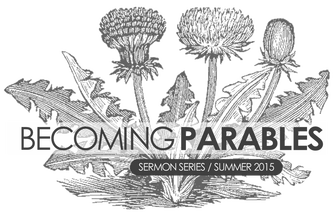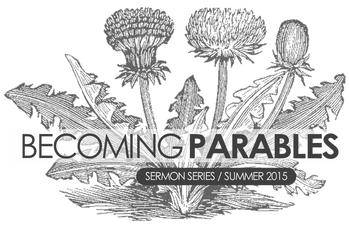 'Becoming Parables' The stories Jesus told were meant to unsettle his listeners. C. H. Dodd defines a parable as 'a metaphor or simile drawn from nature or common life, arresting the hearer by its vividness or strangeness, and leaving the mind in sufficient doubt about its precise application to tease it into active thought.' As you read the Parable of the unjust judge, what struck you? Surprised you? What was vivid or strange? How does the story challenge or widen or deepen your faith? We live in a very different context from Jesus. Stories about shepherds and farming are distant, almost mythic. Can you imagine a contemporary setting for the story Jesus told (for example, 'the Kingdom of God is like riding a Trimet bus ... or going to Pioneer Courthouse Square ...'). Feel free to post a response to the parable or to the sermon. I'd be glad to know how the stories Jesus told have teased your mind 'into active thought.' Peace to you, Rod Stafford Luke 18.1-8
Then Jesus told them a parable about their need to pray always and not to lose heart. He said, ‘In a certain city there was a judge who neither feared God nor had respect for people. In that city there was a widow who kept coming to him and saying, “Grant me justice against my opponent.” For a while he refused; but later he said to himself, “Though I have no fear of God and no respect for anyone, yet because this widow keeps bothering me, I will grant her justice, so that she may not wear me out by continually coming.” And the Lord said, ‘Listen to what the unjust judge says. And will not God grant justice to his chosen ones who cry to him day and night? Will he delay long in helping them? I tell you, he will quickly grant justice to them. And yet, when the Son of Man comes, will he find faith on earth?’
0 Comments
 'Becoming Parables' The stories Jesus told were meant to unsettle his listeners. C. H. Dodd defines a parable as 'a metaphor or simile drawn from nature or common life, arresting the hearer by its vividness or strangeness, and leaving the mind in sufficient doubt about its precise application to tease it into active thought.' As you read the Parable of the new wineskins, what struck you? Surprised you? What was vivid or strange? How does the story challenge or widen or deepen your faith? We live in a very different context from Jesus. Stories about shepherds and farming are distant, almost mythic. Can you imagine a contemporary setting for the story Jesus told (for example, 'the Kingdom of God is like riding a Trimet bus ... or going to Pioneer Courthouse Square ...'). Feel free to post a response to the parable or to the sermon. I'd be glad to know how the stories Jesus told have teased your mind 'into active thought.' Peace to you, Rod Stafford Luke 5.33-39
Then they said to him, “John’s disciples, like the disciples of the Pharisees, frequently fast and pray, but your disciples eat and drink. Jesus said to them, “You cannot make wedding guests fast while the bridegroom is with them, can you? The days will come when the bridegroom will be taken away from them, and then they will fast in those days.” He also told them a parable: “No one tears a piece from a new garment and sews it on an old garment; otherwise the new will be torn, and the piece from the new will not match the old. And no one puts new wine into old wineskins; otherwise the new wine will burst the skins and will be spilled, and the skins will be destroyed. But new wine must be put into fresh wineskins. And no one after drinking old wine desires new wine, but says, ‘The old is good.’”  'Becoming Parables' The stories Jesus told were meant to unsettle his listeners. C. H. Dodd defines a parable as 'a metaphor or simile drawn from nature or common life, arresting the hearer by its vividness or strangeness, and leaving the mind in sufficient doubt about its precise application to tease it into active thought.' As you read the Parable of the sower, what struck you? Surprised you? What was vivid or strange? How does the story challenge or widen or deepen your faith? We live in a very different context from Jesus. Stories about shepherds and farming are distant, almost mythic. Can you imagine a contemporary setting for the story Jesus told (for example, 'the Kingdom of God is like riding a Trimet bus ... or going to Pioneer Courthouse Square ...'). Feel free to post a response to the parable or to the sermon. I'd be glad to know how the stories Jesus told have teased your mind 'into active thought.' Peace to you, Rod Stafford Mark 4.1-20
Again he began to teach beside the lake. Such a very large crowd gathered around him that he got into a boat on the lake and sat there, while the whole crowd was beside the lake on the land. He began to teach them many things in parables, and in his teaching he said: ‘Listen! A sower went out to sow. And as he sowed, some seed fell on the path,and the birds came and ate it up . Other seed fell on rocky ground, where it did not have much soil, and it sprang up quickly, since it had no depth of soil. And when the sun rose, it was scorched; and since it had no root, it withered away. Other seed fell among thorns, and the thorns grew up and choked it, and it yielded no grain. Other seed fell into good soil and brought forth grain, growing up and increasing and yielding thirty and sixty and a hundredfold.’ And he said, ‘Let anyone with ears to hear listen!’ When he was alone, those who were around him along with the twelve asked him about the parables. And he said to them, ‘To you has been given the secret of the kingdom of God, but for those outside, everything comes in parables; in order that “They may indeed look, but not perceive, and may indeed listen, but not understand; so that they may not turn again and be forgiven.” ’And he said to them, ‘Do you not understand this parable? Then how will you understand all the parables? The sower sows the word. These are the ones on the path where the word is sown: when they hear, Satan immediately comes and takes away the word that is sown in them. And these are the ones sown on rocky ground: when they hear the word, they immediately receive it with joy. But they have no root, and endure only for a while; then, when trouble or persecution arises on account of the word, immediately they fall away. And others are those sown among the thorns: these are the ones who hear the word, but the cares of the world, and the lure of wealth, and the desire for other things come in and choke the word, and it yields nothing. And these are the ones sown on the good soil: they hear the word and accept it and bear fruit, thirty and sixty and a hundredfold.’ PMC youth helped bag corn at the Oregon Food Bank on June 6. |
Archives
July 2024
Categories
All
|


 RSS Feed
RSS Feed
